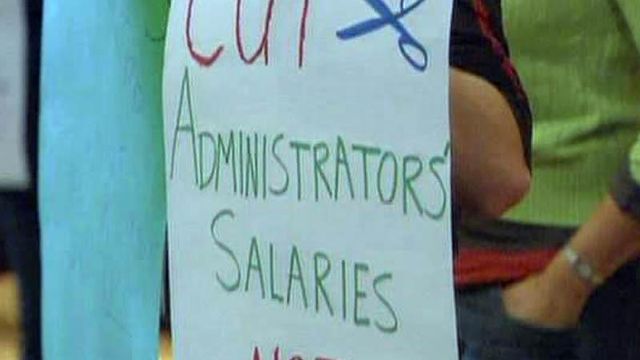Duke, UNC cope with tight budgets
Duke President Richard Brodhead says the university's annual operating budget needs to be cut by $125 million in the coming years, while UNC Chancellor Holden Thorp says it's too early to gauge the impact on Chapel Hill campus.
Posted — UpdatedMeanwhile, University of North Carolina-Chapel Hill Chancellor Holden Thorp said uncertainty over the state budget make it difficult to gauge the impact of the recession on his campus.
"We are facing extraordinary circumstances," Thorp told employees at a Monday afternoon forum. "I am convinced that Carolina has what it takes to get through this."
Duke's endowment lost more than $1 billion last year, shrinking from about $6.1 billion to less than $5 billion. Brodhead also said large donations to the university are harder to come by as people tighten their purse strings during the recession.
"We face the challenge of dealing with an unexpectedly severe downturn with the same creative, strategic, yet careful spirit that brought Duke advantage in times of plenty," Brodhead wrote.
Reducing the university's operating budget will be done over a few years, and Duke's Board of Trustees has agreed to use reserve funds to cover any shortfalls until the $125 million reduction is reached, Brodhead said.
To begin the cuts, the university will freeze salaries for employees making at least $50,000 a year and will provide lower-paid workers with a one-time $1,000 bonus in the 2009-10 year, he said. Compensation for Duke University Health System employees will be determined later.
Also, no new construction projects will be planned unless outside funding has been secured, he said.
"Planning for certain developing projects, including New Campus, will continue, but the start of construction will be deferred. Duke University Health System plans for a new cancer center and a major hospital addition have a different budgetary base, and decisions on these projects will also be made with care," he wrote in the letter.
Duke has completed $1 billion in building projects in recent years, adding more than 1 million square feet of classroom, dormitory and research lab space.
There will be no across-the-board cuts in academics, but each department will have to seek ways to reduce spending and will have to justify its annual budgets, Brodhead said.
"Before any involuntary layoffs are contemplated, we will thoroughly explore and implement steps, including curtailing external hiring, eliminating vacant positions, making internal reassignments and exploring a retirement incentive program for university staff," he wrote in the letter. "Our work force is among our most important resources for ensuring our excellence going forward, and we must nurture its quality even as we make inevitable adjustments."
Duke Vice President for Public Affairs and Government Relations Michael Schoenfeld said the university will "do everything we can to make sure that impact on (employees) is a last resort and not a first resort."
Despite the cuts, Brodhead said Duke would try to keep a lid on tuition. Undergraduate tuition, fees and room and board expenses will increase by 3.9 percent in 2009-10, which he said is one of the smallest tuition increases in recent years. The costs of graduate and professional programs will also rise more slowly than in the past, he said.
None of the 16 UNC campuses knows what to expect yet in terms of budget cuts because state lawmakers are trying to close a $2 billion budget deficit for the 2008-09 year and begin drawing up a 2009-10 budget facing what could be a $3 billion deficit, Thorp said.
UNC-Chapel Hill's endowment lost 16 percent last year, which means less earnings to pay for faculty, programs and scholarships.
Thorp said he anticipates campus layoffs but said he and other chancellors prefer employee furloughs – a move that would require special legislation. If lawmakers don't approve employee furloughs, he said, he would like to set up a system where top earners on campus could contribute part of their money to UNC to help pay to keep others employed.
Catherine Gerdes, the director of planning and administrative services for the university's library system, said she went to the faculty meeting to learn about the budget and possible cuts.
"I think in any organization this size you are going to have some rumors," Gerdes said. "Certainly, people are concerned in this time, but we all know we have to be part of it."
The campus has established an employee assistance fund for laid-off staff. Thorp and his wife contributed $25,000 to the $445,000 fund, with other money coming from a donation, the athletics department and savings from the cancellation of a bus tour last fall.
• Credits
Copyright 2024 by Capitol Broadcasting Company. All rights reserved. This material may not be published, broadcast, rewritten or redistributed.




